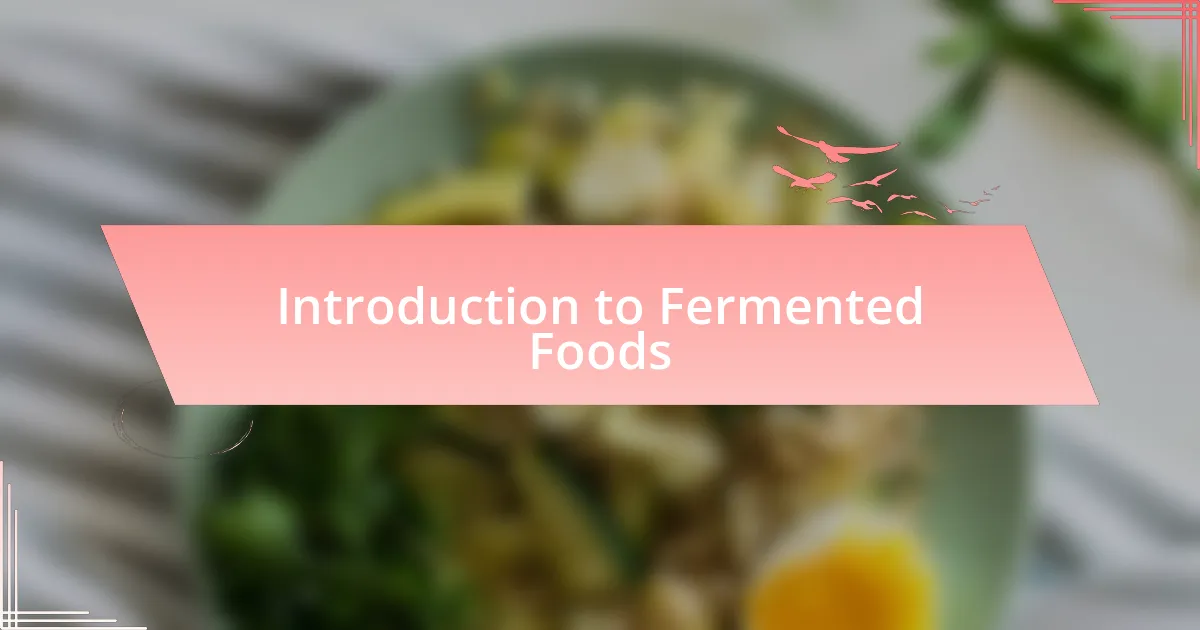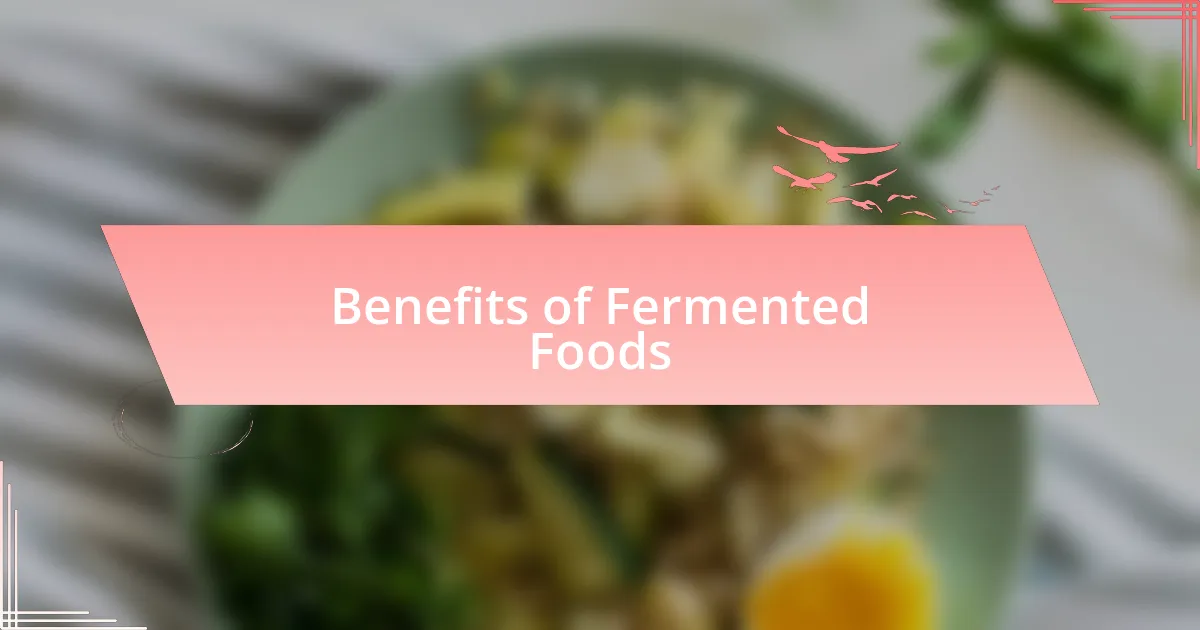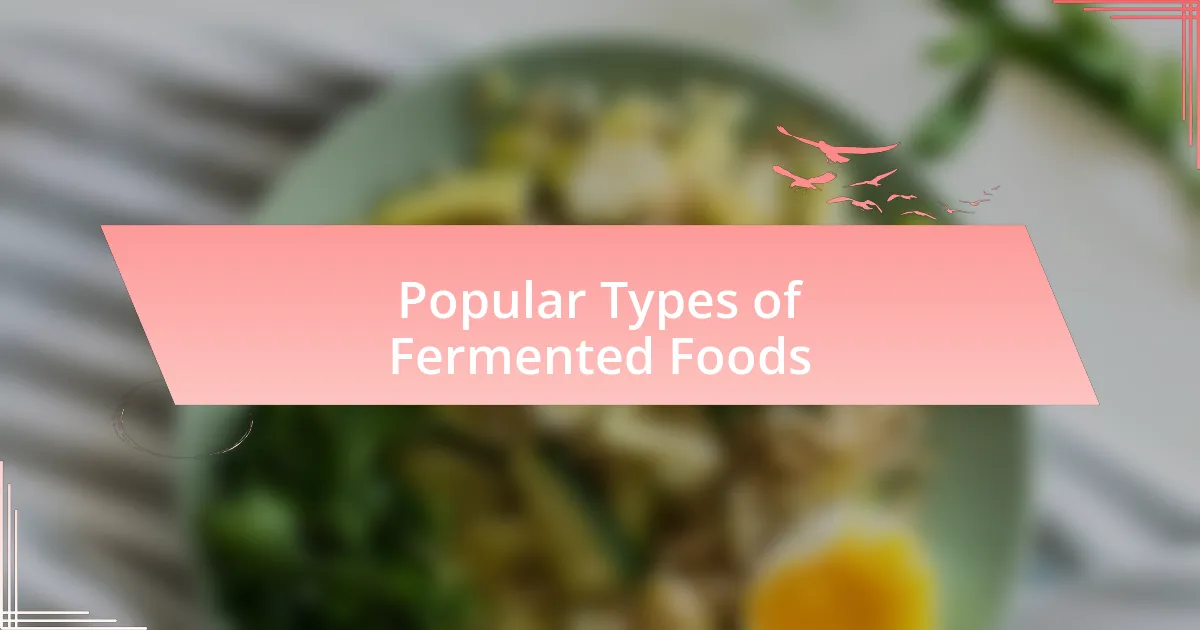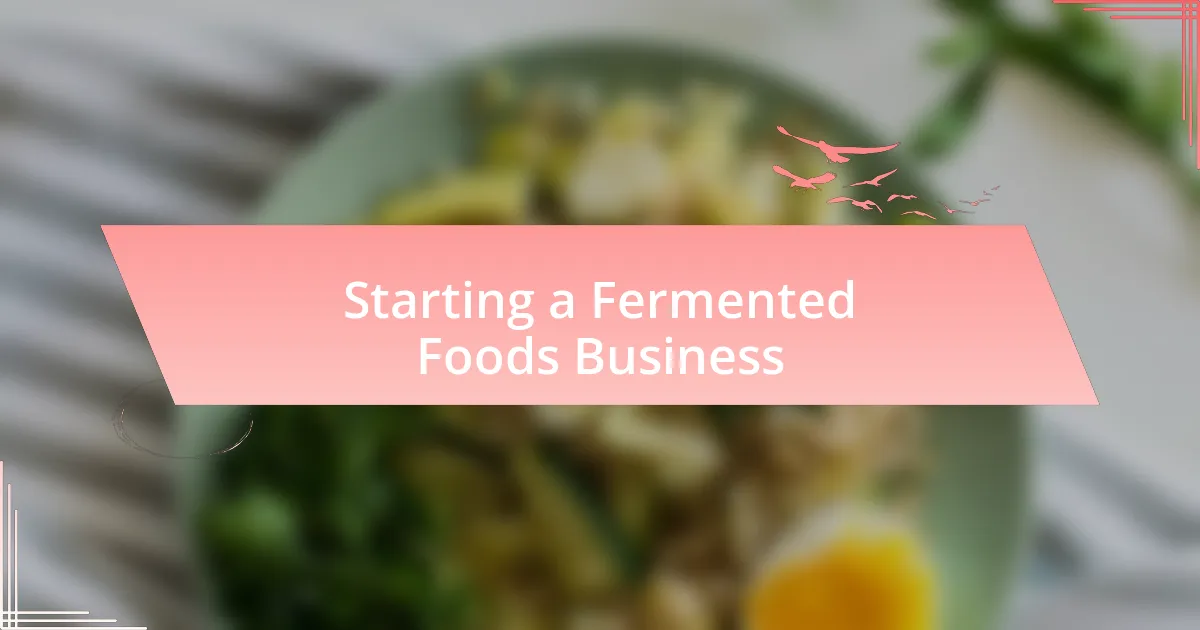Key takeaways:
- Fermented foods, like kimchi and yogurt, offer unique flavors and health benefits, particularly for gut and mental health.
- The fermentation process enhances the nutritional value of ingredients, increasing nutrient absorption.
- Starting a fermented foods business requires choosing a niche, ensuring food safety, and being innovative with flavors.
- Engaging with fermented foods can foster community connections through shared culinary experiences.

Introduction to Fermented Foods
Fermented foods have been part of human diets for thousands of years, and their rich, complex flavors can delight the palate in so many ways. I still remember the first time I tasted kimchi; the spicy, tangy crunch was unlike anything I’d tried before. Have you ever experienced that moment where food opens a door to a new culinary world?
What fascinates me most about fermented foods is their transformative process. Simple ingredients like cabbage or milk undergo magical changes, becoming something entirely new, packed with probiotics that are beneficial for gut health. It’s almost like watching a caterpillar turn into a butterfly—what was once ordinary becomes extraordinary.
In my journey, I’ve learned that fermentation is not just a method of preservation; it’s a true art form. Each culture has its own unique fermented specialties, reflecting their traditions and flavors. Isn’t it amazing how a simple act of adding salt or creating an environment for bacteria can yield such diversity in taste and health benefits? This rich tapestry of global culinary practices makes exploring fermented foods an ongoing adventure.

Benefits of Fermented Foods
When it comes to the benefits of fermented foods, the positive impact on gut health is undoubtedly a standout feature. I remember a time when I struggled with digestive issues, constantly feeling bloated and uncomfortable. Discovering foods like yogurt and sauerkraut made a huge difference—these probiotics worked wonders for me, balancing my gut flora and enhancing my overall digestion. Have you considered how a simple bite of kimchi could support your immune system?
Another fascinating benefit lies in the nutritional enhancement that fermentation provides. While preparing my own sourdough, I noticed that the fermentation process not only adds depth of flavor but also increases the bioavailability of nutrients. This means that my body can absorb more vitamins and minerals. Isn’t it incredible how the right process can turn a humble grain into a health powerhouse?
Fermented foods have also been linked to mental well-being, which is something I’ve experienced first-hand. There was a period in my life when I felt a bit down, and incorporating foods like kefir and miso soup brought a surprising uplift to my mood. The connection between gut health and mental health is becoming more recognized, making me wonder how many others might feel the ripple effect of good bacteria in their lives. Have you thought about the holistic benefits that fermented foods might bring to your emotional state?

Popular Types of Fermented Foods
When you think of fermented foods, yogurt often comes to mind first. I still remember the first time I made my own yogurt at home. Watching the simple milk transform into a creamy delight made me appreciate the magic of fermentation. Have you ever tried making it yourself? The satisfaction of achieving that perfect tang is quite empowering.
Kimchi is another popular fermented food that packs a flavorful punch and boasts numerous health benefits. My first taste of homemade kimchi had me hooked; the rich combination of spices and crunch of the vegetables created an explosion of taste. It’s fascinating to think about how this Korean staple not only enhances a dish but also provides probiotics that can help support digestion. Isn’t it amazing how cultural practices can intertwine with health benefits?
Another favorite of mine is kombucha, a fizzy fermented tea that I first hesitantly sipped at a local café. The slight sweetness balanced with a pleasant tartness made me a fan right away. I was surprised to learn how the fermentation process creates a symbiotic culture of bacteria and yeast—think of it as a miniature science project in a bottle, brimming with potential health benefits. Have you explored the world of kombucha yet? Each sip feels like a celebration of fermentation!

Starting a Fermented Foods Business
Starting a fermented foods business can feel exhilarating and intimidating at the same time. I remember when I first considered launching my own line of fermented products; the blend of passion and uncertainty kept me awake at night. Have you ever found yourself weighed down by endless questions, like where to source quality ingredients or how to stand out in a growing market?
Choosing the right niche is crucial. For instance, I discovered that focusing on unique flavors or regional specialties can attract a dedicated customer base. Initially, I experimented with unusual ingredients to create a signature product; the joy of watching people discover something new is truly fulfilling. How do you think you can bring your personal twist to the traditional fermented foods?
Lastly, compliance with food safety regulations is non-negotiable in this industry. Navigating the legal landscape can be daunting, but having a solid plan helped alleviate my fears. I made it a point to educate myself on local guidelines, which not only boosted my confidence but also laid the foundation for my business’s credibility. Have you considered what steps you would take to ensure the safety and quality of your products?

My Journey into Fermented Foods
The moment I tasted my first homemade kimchi, something clicked. It wasn’t just about flavor; it was about the transformation of humble ingredients into something vibrant and alive. I can still recall the excitement of watching the fermentation process unfold—it felt like magic. Have you ever experienced a food that completely changed your perspective on cooking?
As I began to explore other fermented foods, I immersed myself in the art of pickling and brewing. I vividly remember the first time I brewed my own kombucha; it was a mix of nerves and anticipation. That first fizzy sip was like taking a leap into uncharted territory. How can a simple tea and sugar produce such a complex, effervescent drink?
Through this exploration, I found that fermented foods have a way of connecting people. I hosted small tasting events with friends, where reactions ranged from surprise to delight as they savored my creations. Seeing their faces light up reminded me of the community-building potential that good food can foster. Isn’t it fascinating how sharing a meal can forge deeper connections?